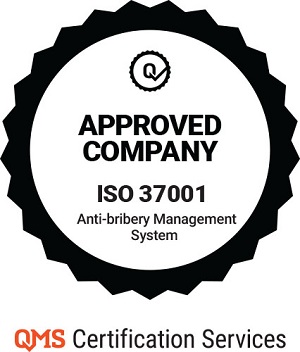 The construction company OEC and its subsidiaries has just had its global operations certified to ISO 37001, the global standard for anti-bribery systems management. The company and its subsidiaries (OECI, CNO, Tenenge, CBPO and Oenger) were audited nationally and internationally by QMS Certification Services. The certificate is valid for 3 years.
The construction company OEC and its subsidiaries has just had its global operations certified to ISO 37001, the global standard for anti-bribery systems management. The company and its subsidiaries (OECI, CNO, Tenenge, CBPO and Oenger) were audited nationally and internationally by QMS Certification Services. The certificate is valid for 3 years.
"Receiving ISO 37001 international certificate is a landmark for the company and corroborates the solidity of the processes, tools and internal control instances created in recent years, equal to the best governance standards for publicly traded companies," says Alexandre Baltar, OEC's Chief Compliance Officer (CCO). "The seal had already been earned for operations in Brazil in May 2021 and was expanded to international operations after a recently completed external audit, reinforcing the consistency of our practices and the company's determination to maintain an ethical, upstanding and transparent performance," he adds.
ISO 37001 attests to the management and operation of OEC's and its subsidiaries Integrity and Risk Management Program, highlighting, according to the certifier's report, the ethical performance and the fight against corruption, bribery, money laundering and anti-competition practices, in the public or private sphere, both in operations in Brazil and abroad, in management, design, procurement, construction, assembly, commissioning, start-up, technical assistance and maintenance activities in industrial, oil & gas and pipeline works for mining (hydroelectric, thermoelectric, transmission lines and substations), gas and pipelines, petrochemical, mining, energy (hydroelectric, thermoelectric, transmission lines and substations), infrastructure (sanitation, irrigation, road works, highways, railroads, tunnels, bridges and overpasses), ports and dredging, airports, subways, BRTs and buildings, including hospitals.
Governance actions implemented since 2016:
• Incorporation of independent board members with extensive experience in the market;
• Installation of advisory committees in areas such as Integrity, Audit, Finance and Risks, coordinated by independent directors;
• Implementation of the Ethics Committee to evaluate possible violations of the code of conduct and define remedial measures;
• Institution of the functions of Chief Compliance Officer and Head of Internal Audit, who report directly and independently to the Board of Directors;
• Internal Auditing Team trained and certified as lead auditors in ISO 19001 and ISO 37001 standards;
• Establishment of broad measures for prevention, detection and remediation of any actions in disagreement with the company's Integrity Policy and Code of Conduct;
• Creation and availability of an Ethics Line, managed confidentially by an independent company;
• Adoption of a single, centralized payment system at the parent company for all countries and contracts;
• Establishment of a comprehensive program for continuous monitoring of Compliance and Internal Audit, with performance indicators that allow the company's commitments to be measured;
• Adherence to and active participation in collective actions such as the Business Movement for Integrity and Transparency, an initiative of the Ethos Institute, the Movement for Integrity in the Engineering and Construction Sector, secreted by the United Nations (UN) Global Compact Network Brazil and the Ethos Institute, and the Brazilian Institute for Self-Regulation in the Infrastructure Sector (IBRIC).
Receiving ISO 37001 is a recognition for the application of the integrity system in the different national and international operations.